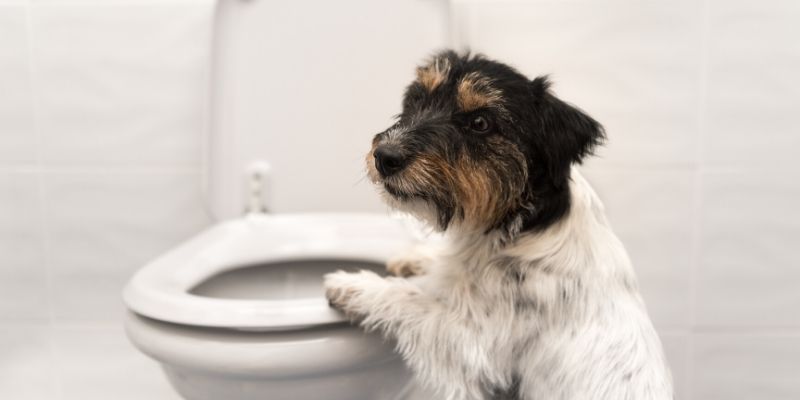There are several reasons why you can discover ketones in dog urine, and it is not exclusively a direct cause of a severe health issue.
Do you have a specific question about the subject? Then use the table of contents below to jump to the most relevant section. And you can always go back by clicking on the black arrow in the right bottom corner of the page. Also, please note that some of the links in this article may be affiliate links. For more details, check the Disclosure section at the bottom of the page.
Here's what we'll cover:
What causes ketones in dog’s urine?
It would be best if you always thought about ketosis in dogs as it is the case for humans. Ketones in a dog’s urine aren’t at all times a threating indicator of a condition. Instead, it might tell you that your dog’s body tries to adjust to a new diet, in which burning fat for fuel is the primary approach. Some of the causes of ketones in do urine might be:
- Energy-restricted diets, such as intermittent fasting;
- A high-fat, low-carbohydrate diet;
- Several health issues, including diabetes and cancer

The first thing you need to know is that ketosis and ketoacidosis are not the same. Ketosis and the ketones in your dog’s urine are related to a nutritional process, while ketoacidosis is diabetes symptom-related.
As such, ketosis can happen in your pet’s body when your dog ingests a high fat, protein-rich, and low-carb diet. The body uses glucose for energy instead of burning fat, which results in an increase in ketone levels. Still, this is a natural outcome, and the ketone levels don’t increase at dangerous levels as they do in DKA.

Ways to test ketones in dog urine?
Based on your dog’s breed and size, you can test for ketones in his urine early in the morning, late in the afternoon or in the evening. Keep in mind that if you’re monitoring your dog’s health, the measurement should happen at the exact time each day.
Pet urine test strips. More details .
The first thing you need to do is gather some supplies. These include clean containers for urine, urine dipsticks, and a notebook to gather the data from the test.
To collect the urine, you will have to:
- Take your pet for a walk and keep him on a leash. Look at his behavior and remain close to him so that you will be within reach when he urinates.
- Use a clean and dry container and catch the urine when your dog urinates.
Afterward, you will have to:
- Read the instructions for the dipsticks (e.g. proved to be great).
- Use one test strip and fully immerse it in the urine.
- Remove the strip from the container and tap it to remove excess urine.
- Check the results after the recommended waiting time.
- Use the chart on the dipstick container to compare colors.
- Document the results and add the time of collection, too.

What do high ketones in a dog’s urine mean?

Ketones in a dog’s urine might indicate that your dog has either an unbalanced diet or he simply follows a ketogenic diet in which the main fuel source is fat. Still, some health conditions might cause high ketones levels, such as:
- Diabetes;
- Neurological disorders;
- Liver conditions

You might also like:
- Doghint’s secret guide on getting FREE dog food
- 9 most desirable gift ideas for dog owners
- Dog Subscription Guide. We really found one under $10.
What if there are high ketones but no glucose in pet’s urine?
Keep in mind that in order to determine a severe health condition in your dog, it is always best to ask for your veterinarian’s advice. In most cases, high ketones in your dog’s urine are a direct result of his diet. This means that if there is no glucose in his urine, the chances of your dog being diagnosed with diabetes are extremely low.

Ketones in puppy urine

In most cases, ketosis affects older dogs and females, but it is not uncommon to see puppies with ketones in their urine. One of the causes might be dehydration and electrolyte imbalances.
This is frequent, especially when your dog still drinks milk.
Anyhow, it is not uncommon to see ketones in a puppy’s urine, as it most likely indicated that his body uses fats instead of carbs for energy. Adjustments to his diet can solve this issue, but it is always best to ask for your vet’s advice if you’re not sure about it.

How to lower high ketones in your dog’s urine?
The first thing you can do to lower high ketones in your dog’s urine is to modify his diet slightly. Also, you should make sure he gets adequately hydrated, as fluids can significantly decrease ketones. Still, if you suspect that your dog has diabetes due to additional symptoms, you should take him for a veterinary appointment. Several health issues that cause high ketones (including diabetes) require intravenous fluid therapy.

Ketones in dog urine. Conclusion
The bottom line is that ketones in your dog’s urine aren’t necessarily a bad thing. It might merely be an indicator of a keto diet (which offers a LOT of benefits for your pet when done right) or dehydration.

It would help if you always focused on creating for your dog a healthy diet based on his breed and lifestyle. In this way, you will keep up his health and prevent severe health conditions.
Thanks for the blog graphics: Canva.com


